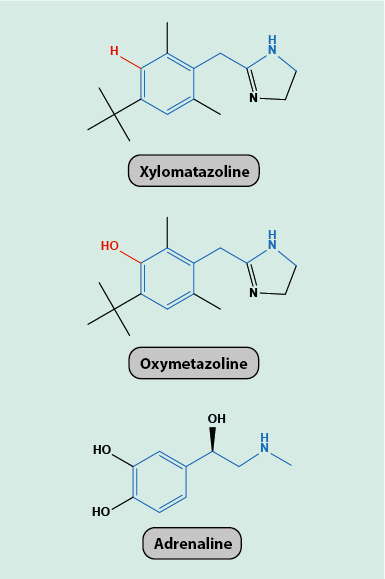Decongestant medications
Probably everybody at some point in time has used some nasal spray to unblock a stuffy nose when afflicted by a bad cold, hay fever (or other allergic reactions), or sinusitis. Whilst such decongestant nasal sprays do not treat the underlying condition, they can be effective in rapidly easing the symptoms of a blocked nose.
In oral and maxillofacial surgery, nasal decongestant sprays are mainly used to ease symptoms of nasal or antral mucosal swelling after surgery. Examples are midface and orbital fractures, or following surgery to close an oroantral fistula when postoperatively blowing of the nose should be avoided.
Amongst a number of medicinal agents available for nasal decongestion, xylometazoline and oxymetazoline are widely used (see Figure 1 for the molecular structures).

The two chemicals xylometazoline and oxymetazoline are very closely related to each other. Both are designed to act as activators (agonists) of receptors of adrenaline in the nose, both drugs achieve this by mimicking some aspects of the molecular structure of adrenaline (Figure 1). The topical application of decongestant medications is effective because of the large number of adrenergic receptors in the blood vessels in the nasal mucosa.
Nasal congestion occurs because of swelling of the larger veins in the nasal mucosa (to be distinguished from veins in nasal skin which are relevant in skin surgery and rhinoplasty (corrective surgery on the nose)), in response to infection and/or inflammation. Decongestion after topical application occurs by vasoconstriction of larger veins and small arteries, increasing the volume of the nasal airway and easing nasal breathing. In addition, the exudation (oozing) of fluids is reduced.
This type of decongestant medication is not suitable for long-term use and should be used with caution if hypertension (high blood pressure) is an issue. Long-term use can lead to damage of the nasal mucosa as well as to the development of tolerance and rebound (chronic) congestion (known as rhinitis medicamentosa) after terminating the use of the drug.